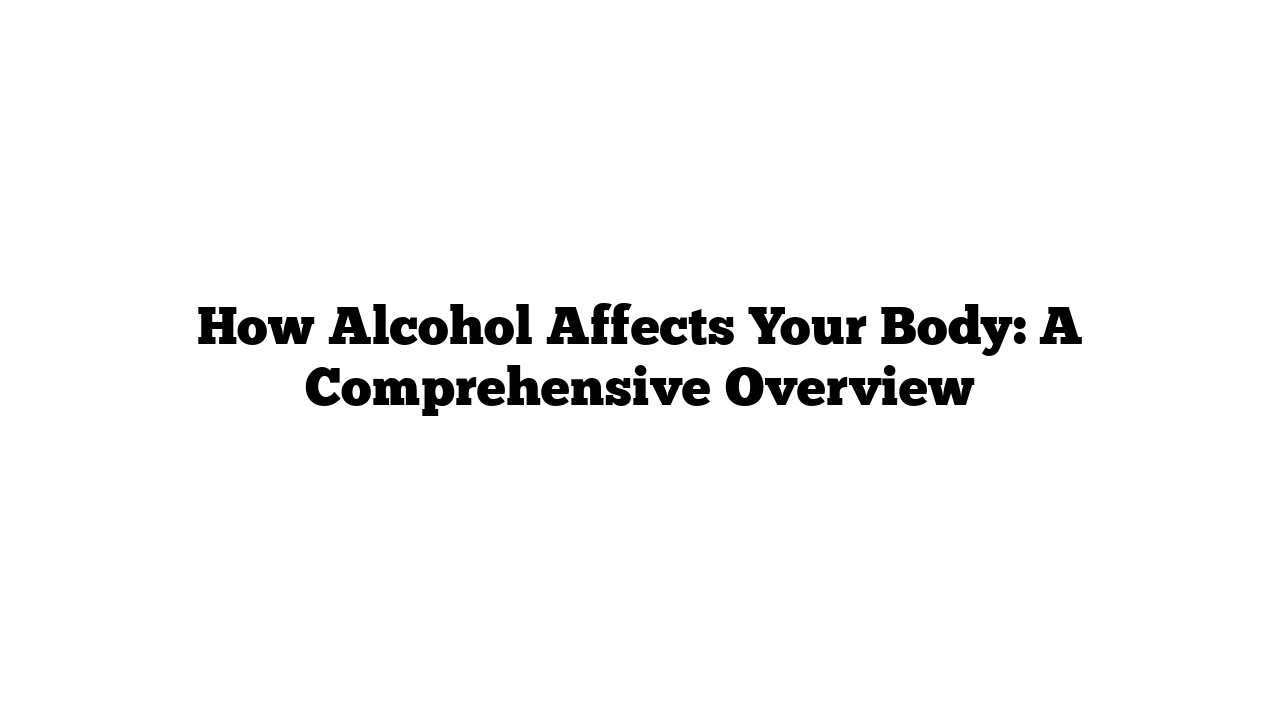Introduction to Alcohol’s Impact
Alcohol consumption is a common social activity, but many people may not fully understand the wide-ranging effects it has on the body. While it’s well-known that excessive drinking can lead to liver damage, alcohol affects nearly every organ. In this article, we’ll explore how even a single drink can alter your body’s functions and the long-term consequences of chronic drinking.
Understanding Ethanol: The Alcohol Molecule
The primary alcohol found in beverages is ethanol. This substance is not meant to be in our bodies and can cause significant harm from the moment we consume it. As a moderate nonpolar solvent, ethanol can dissolve lipids, which leads to irritation and inflammation in cell membranes.
Metabolism of Ethanol
Once ingested, ethanol is metabolized into acetaldehyde, a highly toxic compound that contributes to much of the damage associated with alcohol consumption. This process is crucial in understanding why alcohol consumption is harmful to our health.
The Brain: Alcohol’s Central Role
Alcohol’s intoxicating effects are primarily due to its interaction with GABA receptors in the brain, enhancing the inhibitory effects of this neurotransmitter. While there is a myth that alcohol kills brain cells, it actually impairs the body’s ability to absorb thiamine (Vitamin B1), essential for brain function. Prolonged deficiency can lead to severe conditions, such as Wernicke-Korsakoff syndrome, which can result in dementia and memory loss.
“Wernicke-Korsakoff syndrome highlights the profound impact alcohol can have on cognitive health,” emphasizes Dr. Jane Smith, a neurologist specializing in addiction.
Digestive System: The Hidden Effects
When consuming high-alcohol-content drinks (over 15% ABV), digestion can be significantly delayed. Alcohol interferes with digestive enzymes, leading to discomfort as bacteria in the gut take over the breakdown of food. As the alcohol enters the bloodstream, it is absorbed primarily through the intestines, and any remaining alcohol can be exhaled, which is why breathalyzers can detect it.
Alcohol’s Impact on Gut Health
Chronic alcohol consumption can damage the gut lining and lead to conditions like alcoholic lung, where the immune response is impaired, increasing the risk of respiratory infections.
The Heart: A Double-Edged Sword
Alcohol consumption raises heart rate and blood pressure, a condition known as tachycardia. While moderate drinking may not pose a significant threat, chronic drinking can severely damage cardiovascular health. The Australian Heart Foundation suggests limiting alcohol intake to no more than two drinks per day to mitigate these risks.
The Kidneys: Indirect Consequences
Ethanol inhibits vasopressin, a hormone responsible for water reabsorption in the kidneys. As a result, drinking alcohol leads to increased urination, often causing dehydration.
The Liver: The Primary Detoxifier
The liver is the main organ responsible for detoxifying ethanol, converting it into harmless compounds. However, excessive drinking leads to inflammation and liver damage, resulting in fibrosis and potentially progressing to cirrhosis, a condition where the liver can no longer function properly. This can lead to symptoms like abdominal swelling from fluid retention.
The Pancreas: A Hidden Casualty
The pancreas also metabolizes ethanol but is more sensitive to damage than the liver. Chronic drinking can lead to alcoholic pancreatitis, a painful condition that increases the risk of pancreatic cancer.
Bone Health: The Long-Term Consequences
While moderate drinking does not adversely affect bone health, chronic alcohol use can lead to decreased bone density. The liver plays a vital role in metabolizing Vitamin D, crucial for calcium absorption. A compromised liver can result in osteoporosis, weakening bones over time.
Final Thoughts on Alcohol Consumption
While this article outlines the numerous ways alcohol can affect the body, it’s important to note that moderation is key. Enjoying alcohol responsibly and in limited quantities can mitigate many of the associated health risks.
In the end, understanding how alcohol impacts our body empowers us to make informed choices about our drinking habits.
